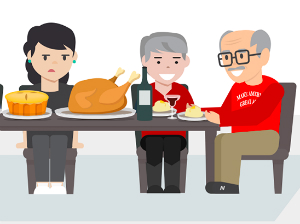Reader’s Note: If you’re experiencing physical or sexual abuse by parents, immediately contact the National Domestic Violence Hotline at 800-799-7233 for urgent, confidential support 24/7. Taking action is crucial to your safety and reclaiming control over your life—it’s never your fault.
Dealing with any toxic relationship in your life can be incredibly painful and challenging, but when the toxicity comes from your parents — the people who are supposed to show you what unconditional love is and protect you — it can be unbearable. Toxic parents can be mentally and physically abusive, impacting your mental health significantly.
Recognizing the signs of toxic behavior and learning how to deal with toxic parents is possible — and crucial — if you hope to break the pattern of mental, physical, and emotional abuse. As you explore the different types of toxic parents, you’ll start to see the impact their toxic behavior has had on you, and more importantly, you’ll begin to understand that you didn’t deserve their emotional abuse.
Keep reading to learn more about signs you have a toxic parent and how to cope and heal from it.
What is a Toxic Parent?
The term “toxic parent” encompasses an extensive range of harmful behaviors, all of which serve to undermine a child’s sense of self-worth, stability, and overall mental well-being. A toxic mother or father can be controlling, demanding, and harsh, putting you at high risk for long-term mental and physical health issues well into adulthood.
Toxic parent traits include deeply disturbing behaviors that can affect a child’s mental health at any age. Toxicity can be deceiving because it’s not always about obvious and overt abuse. Subtle demeanors, actions, and behaviors by a toxic person can harm a child’s well-being and development. Toxic parents might use verbal belittlement, emotional manipulation, and/or physical intimidation to control their children.
“Family dynamics and relationships are complicated. It can be hard to understand how helpful or hurtful our family members, especially our parents, can sometimes be. Understanding and learning how to deal with and navigate unhealthy family dynamics can be crucial to having a more stable lifestyle.”
– Talkspace therapist Minkyung Chung, MS, LMHC
Types of toxic parents
There are many types of toxic parents. Understanding various toxic parent traits can be the first step in learning how to identify unhealthy behavior your parents might engage in.
- Dismissive: The dismissive parent overlooks or undermines their child’s feelings and needs. They create an environment where the child feels undervalued and starts doubting their self-worth or struggling with self-expression.
- Helicopter: The helicopter parent hovers over their child to an unhealthy extent. They micromanage every aspect of a child’s life, and while it may appear to come from a loving and healthy place of concern, helicopter parenting ultimately stifles independence and hampers the development of critical problem-solving skills.
- Narcissistic: The narcissistic parent centers every part of the family dynamics around themselves. A narcissistic mother or narcissistic father seeks or demands admiration and struggles to empathize with anyone else’s — including their children’s — needs. Children raised by parents with narcissistic tendencies often have a difficult time establishing and maintaining healthy relationships later in life due to the environment they grew up in.
- Passive or permissive: Passive — also known as permissive — parents will avoid confrontation at all costs. They have difficulty maintaining expectations for their children and typically won’t set boundaries or demands. The household tends to have little structure, and they rarely punish their children. Children who grow up with permissive parents can have a chaotic path in life and might struggle with authority.
21 Signs of a Toxic Parent: How Do Toxic Parents Act?
There are several different types of toxic parents, and the signs of each can vary. Regardless of the type or the signs, the actions of a toxic mother or father can be incredibly damaging to a child’s self-perception and future relationships.
Look out for these signs to determine if you have toxic parents:
1. They are verbally abusive
Verbal abuse is a hallmark of toxic parenting. It can come in the form of belittling, constant criticism, or verbally assaulting or dismissing a child’s feelings.
2. They are emotionally or psychologically abusive
The psychological or emotional abuse that toxic parents inflict on their children can be devastating. Harsh and intentional criticism from a toxic person can impact a child’s self-esteem or sense of self-worth and have lifelong implications. The psychological or emotional abuse that toxic parents inflict on their children can be devastating. This form of abuse includes a range of behaviors, such as constant criticism, threats, rejection, and manipulation, aimed at diminishing the child’s self-esteem or sense of self-worth. Harsh and intentional criticism from toxic parents can impact a child’s mental and emotional well-being, leading to lifelong implications. Undermining the child’s confidence and fostering a sense of worthlessness can have profound effects on their development and adult relationships.
3. They are violent or physically abusive
Toxic parents might be violent with their children — they may kick, hit, punch, or even choke a child, often defending their actions with a claim that they’re just “trying to teach” the child a lesson. We know from extensive research, though, that violence has an intense and severe emotional impact on children, including a heightened risk of future violent behavior by the children themselves.
4. They put their own needs first
These parents have no problem putting their own needs above their children’s. Their selfish approach to parenting commonly results in neglect and a blatant unwillingness to provide even basic necessities for their children.
5. They’re sexually inappropriate
Sexual inappropriateness can include molestation, exposure to sexual content, and other sexual acts, including trafficking or pornography.
6. They’re controlling
Parents who are overcontrolling will force themselves on their children, interfering with their natural development toward independence and an individual sense of self. These parents might expect their children to mold into their vision about who or what children should be. Controlling parents often refuse to give their children the freedom they need to grow, mature, and explore their interests in life.
7. They use harsh discipline and punishment
Harsh discipline and punishment are familiar traits of toxic parents. Reactions to a child’s mistake can be significantly more severe than warranted. Punishments can be physical, verbal, or emotional and rarely fit the “crime.”
8. They’re rigid
These parents demand total obedience from their children. They do so under the guise of teaching a child to respect authority. In reality, they’re discounting the natural stage where children begin to push back and question things in their lives (which is not only normal; it’s healthy). The toxic parent can’t or won’t understand that this developmental phase is part of growing up, and they’ll react to it with aggression and anger.
9. They’re jealous
Like anyone with jealous tendencies, toxic parents can become insecure if their child establishes or maintains a meaningful, healthy relationship with someone else. They might see the connection as a threat, and they can go so far as to use manipulation or intimidation to sever the relationship in an attempt to keep the child to themself.
10. They’re self-absorbed and expect or demand admiration
Self-absorbed parents have an intense need for admiration. They demand praise while refusing to offer it in return. If a child withholds, these parents tend to become fiercely angry and abusive.
11. They don’t support you
While healthy parents are their children’s biggest cheerleaders in life, in the toxic parenting cycle, a child rarely gets any support or recognition regarding their accomplishments and successes. As most children crave support and acknowledgment from their primary caregiver, this trait can be incredibly harmful.
12. They’re easily offended
A toxic parent can be easily offended and take any difference of opinion or questioning as disrespect. Over time, this behavior can cause a child to suppress any curiosity or ideas that don’t blatantly align with their parents’ ideals out of fear of the reaction they’ll get.
13. They don’t respect you
While toxic parents demand respect from their children, they rarely show it in return. Toxic parents who don’t respect their children often undermine their autonomy and dismiss their feelings, making it clear that the child’s opinions and desires are of little value. This behavior damages the parent-child relationship and instills a sense of worthlessness and insecurity.
Additionally, such parents may invade their child’s privacy or disregard boundaries, further signaling a lack of respect. This constant dismissal can deeply affect the child’s ability to trust and engage in future relationships with a sense of equality and mutual respect.
14. They don’t respect boundaries
Boundaries are essential in any healthy relationship. Healthy parents will model how to set and enforce boundaries for their children. The toxic parent, by contrast, refuses to respect any boundaries their child sets, instead modeling behavior that continuously crosses them.
15. They are overly critical
Constructive criticism can be valuable, but overly critiquing a child — even an adult — offers little value or benefit. Toxic parents can criticize every aspect of their children’s lives, from the minute details to significant life decisions.
16. They share private matters with others
Oversharing private or sensitive matters can fracture the sense of safety and trust that should be intrinsic in the parent-child relationship. Whether it’s sharing information that’s not age-appropriate with the child or oversharing intimate details with an outsider that embarrasses the child, this behavior is harmful and long-lasting. It can create serious trust issues in the future.
17. They embarrass you (often intentionally)
A toxic parent might embarrass their child, often on purpose, to instill a sense of power. The effect includes shame and fear, as a child learns they can’t trust their parent to protect and guard them, but instead is willing to humiliate them on a whim.
18. They blame others
A classic trait in toxic or narcissistic parenting is an inability to take accountability. Instead, the go-to behavior is to blame others for anything and everything. This constant deflection prevents the parent from recognizing and correcting their mistakes and instills a skewed perspective of responsibility and accountability.
19. They are manipulative
Manipulation is common in toxic parents. They will use whatever they can to control a situation, including gaslighting and manipulation. They’ll go to great lengths to prove their authority and establish a sense of control over their child.
20. They are enmeshed with you
When parents become enmeshed with their children, they prevent the child from establishing any sense of individualization. They create a relationship where needs, wants, and goals are intertwined, with complete emotional attachment between parent and child. This goes far beyond a healthy, close relationship. The behavior can result in adult children feeling like they have a responsibility to protect their parents, often to a point beyond their own needs.
21. They have emotional outbursts (usually unprovoked and out of nowhere)
Toxic parents can be emotionally immature, having unprovoked outbursts, resulting in children trying to avoid their parents out of fear of those emotional episodes.
Physical and Mental Effects of Toxic Parents
The effects of toxic parenting can be both physical and mental. Worse, they don’t disappear just because a child grows up. The consequences tend to linger well into adulthood. People grow up in toxic environments often:
- Have a high risk of developing chronic mental health conditions like depression and anxiety
- Struggle with executive functioning
- Might develop post-traumatic stress disorder (PTSD)
- Are more likely to be in abusive relationships in the future
- Can have a higher risk for cardiovascular disease
- Have low self-esteem
- Display self-harm tendencies or suicidal behavior
- Develop a weak immune system
- Struggle to establish healthy, mutually-rewarding relationships as adults
How to Deal with Toxic Parents: 7 Tips
Learning how to deal with toxic parents isn’t easy, but with the right tools, you can do it.
1. Set boundaries (and stick to them)
Setting boundaries with parents is incredibly important when they exhibit toxic behaviors. This goes beyond just expressing how you expect to be treated. You also need to ensure that your boundaries are respected and have clear consequences if they’re not.
2. Know that your feelings are very valid
Toxic parents might try to gaslight you into believing your feelings aren’t valid. Trust that your emotions are warranted — you have a right to be respected and heard.
3. Don’t try to change them (you can’t!)
If, at any point in the relationship, parentification has occurred — when a child takes on a parent’s role — nurturing can feel natural. You might feel an instinct to try and help a toxic parent, but remember, that’s not your place or your responsibility.
4. Be realistic and avoid unhealthy expectations
Unhealthy expectations will lead to disappointment and frustration. Be realistic about your relationship and try to find a place of acceptance.
5. Be mindful about what you share with them
Unfortunately, if you hope to maintain a relationship with a toxic parent, you should be wary about what you share with them. Remember that toxic parents use emotional manipulation to control their children. Keeping your guard up can protect against further hurt.
6. Find a support system
Even if your parents can’t offer you the love and support you need, it’s still essential to find this somewhere in your life. Cultivating a solid support system can offer the tenderness your parents can’t. It can also provide an outside perspective when you need to be reassured that your feelings are valid.
Practice self-care
Self-care is an act you can perform for your own protection and vitality. It can rejuvenate and re-energize your spirit. Practice self-care through meditation, journaling, walking, reading a book, painting, cooking, or doing anything that feeds your soul.
“Seeking help in navigating and dealing with toxic parents is a positive step in learning to handle the effects of this type of parenting and how to heal from the consequences. It allows for a safe space to discuss emotions and thoughts and shows how to untangle oneself from the situation.”
– Talkspace therapist Minkyung Chung, MS, LMHC
Seek Professional Help for Toxic Parents with Talkspace
If you’re dealing with toxic parents, knowing when and how to seek help is the first step. The impact of this type of parent-child relationship can have a profound effect on your mental health, but there is light at the end of the tunnel.
Talkspace is an online therapy platform that offers convenient and affordable therapy to help you overcome a toxic upbringing. We can help you recognize the signs of what you experienced so you can break the cycle and begin to rebuild your sense of self-worth.
Reach out to Talkspace today to learn more about how to heal from your toxic parents with online therapy for teens and adults.
Sources:
- Ohene S, Ireland M, McNeely C, Borowsky I. Parents’ Use of Physical Punishment Increases Violent Behavior Among Youth. Pediatrics. 2006;117:441-447. https://www.apa.org/pi/prevent-violence/resources/violent-behavior. Accessed January 28, 2024.
- Schilling EA, Aseltine RH, Gore S. Adverse childhood experiences and mental health in Young Adults: A longitudinal survey. BMC Public Health. 2007;7(1). doi:10.1186/1471-2458-7-30. https://bmcpublichealth.biomedcentral.com/articles/10.1186/1471-2458-7-30. Accessed January 28, 2024.
- DePrince AP, Weinzierl KM, Combs MD. Executive function performance and trauma exposure in a community sample of children. Child Abuse & Neglect. 2009;33(6):353-361. doi:10.1016/j.chiabu.2008.08.002. https://pubmed.ncbi.nlm.nih.gov/19477515/. Accessed January 28, 2024.
- Margolin G, Vickerman KA. Posttraumatic stress in children and adolescents exposed to family violence: I. Overview and issues. Professional Psychology: Research and Practice. 2007;38(6):613-619. doi:10.1037/0735-7028.38.6.613.https://pubmed.ncbi.nlm.nih.gov/20107623/. Accessed January 28, 2024.
- Johnson SB, Riley AW, Granger DA, Riis J. The science of early life toxic stress for pediatric practice and Advocacy. Pediatrics. 2013;131(2):319-327. doi:10.1542/peds.2012-0469. https://pubmed.ncbi.nlm.nih.gov/23339224/. Accessed January 28, 2024.
- Zhao J, Zhao H, Zhou A. Negative parenting styles and psychological crisis in adolescents: Testing a moderated mediating model of school connectedness and self-esteem. Behavioral Sciences. 2023;13(11):929. doi:10.3390/bs13110929. https://www.ncbi.nlm.nih.gov/pmc/articles/PMC10669031/. Accessed January 28, 2024.
- Schmeer KK, Ford JL, Browning CR. Early childhood family instability and immune system dysregulation in adolescence. Psychoneuroendocrinology. 2019;102:189-195. doi:10.1016/j.psyneuen.2018.12.014.https://www.ncbi.nlm.nih.gov/pmc/articles/PMC6689237/. Accessed January 28, 2024.
- Dunham, S. M., Dermer, S. B., & Carlson, J. (Eds.). (2011). Poisonous parenting: Toxic relationships between parents and their adult children. Routledge/Taylor & Francis Group.https://psycnet.apa.org/record/2011-12795-000. Accessed January 28, 2024.
Talkspace articles are written by experienced mental health-wellness contributors; they are grounded in scientific research and evidence-based practices. Articles are extensively reviewed by our team of clinical experts (therapists and psychiatrists of various specialties) to ensure content is accurate and on par with current industry standards.
Our goal at Talkspace is to provide the most up-to-date, valuable, and objective information on mental health-related topics in order to help readers make informed decisions.
Articles contain trusted third-party sources that are either directly linked to in the text or listed at the bottom to take readers directly to the source.




